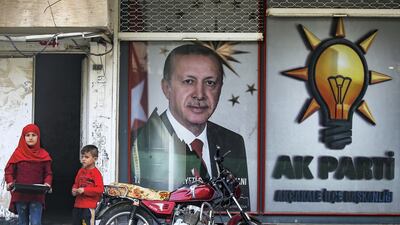Seventeen years to the month after Turkey’s ruling Justice and Development Party (AKP) won its first election, the party is showing signs of fatigue as members abandon the movement that has dominated Turkish politics for nearly two decades.
In recent months, claims of dwindling party numbers suggest increasing disillusionment among its conservative supporters.
This week the opposition Arti Gercek newspaper cited figures from the Supreme Court to show that nearly 58,000 members had quit the AKP in the past two months.
Since August 2016, a month after a failed coup that led to a widespread crackdown, more than 902,000 AKP supporters resigned their party membership, the newspaper said.
President Recep Tayyip Erdogan, who leads the AKP, said in September that party numbers had dropped by 290,000 and claimed the fall was largely due to deaths.
Despite such losses, the party still has a membership of 9.8 million – figures that easily surpass most major political parties in Europe as well as domestic rivals.
The party is also threatened by high-level resignations, most notably former prime minister Ahmet Davutoglu and Ali Babacan, a former deputy prime minister who oversaw the economic successes of previous AKP governments. Both are planning to establish new centre-right parties to challenge the AKP in the coming months.
In an interview with broadcaster Haberturk on Tuesday night, Mr Babacan, a founding member of the AKP who quit in July, warned of the risks of "one-man rule" and said Turkey had "entered a dark tunnel with its problems on every issue growing by the day".
Under a presidential system introduced last year that sidelined MPs, power has been concentrated in the hands of Mr Erdogan as the country has taken an increasingly authoritarian path.
“There were important principles and values during the foundation of the AK Party but there has been a significant departure from these principles,” Mr Babacan said.
The past three years encompass not just the post-coup purges but also a crisis during which the economy has slipped into recession as the lira plummeted in value and inflation and unemployment soared.
In local elections this year the AKP lost control of Turkey's largest cities, including Ankara and Istanbul, which had previously been a major source of patronage for the party.
A poll by Ada Research released yesterday showed public support for Mr Babacan and Mr Davutoglu at about 9 per cent, a significant figure given the AKP has in recent years had to rely on an electoral alliance with the Nationalist Action Party.
Ahmet Evin, a political scientist at Istanbul's Sabanci University, said tensions in the AKP stemmed from the switch to the presidential system.
“The main problem is that, for the conservative mainstream, the party is deviating from what they consider democracy,” he said.
“This is a kind of frustration within the leadership of the party. That frustration is increasing because they had a comfortable majority in a parliamentary system where they could come to an agreement between the right wing and Islamist parts of the party. Now there’s a feeling the national will is no longer being respected by the party.”
The new system, confirmed in last year’s presidential election, has led to a cabal of insiders close to Mr Erdogan vying for power, Prof Evin said.
“There are people who are close to the [presidential] palace who are alienating those who had power and were part of the Cabinet and party,” he said.
The factionalism at the top of government has largely focused on Mr Erdogan’s son-in-law, Finance Minister Berak Albayrak, and Interior Minister Suleyman Soylu. The rivalry has become an open secret, with newspapers reporting the ministers ordering phone-tapping and media leaks against each other.
Although Turkey is not due to hold another election until 2023, there have been suggestions recently that the vote will be called early.
The leftist BirGun newspaper reported on Wednesday on the likelihood of an election by April 2021 as Mr Erdogan seeks time to restore the economy and nullify the impact of the new parties formed by Mr Babacan and Mr Davutoglu.
The latter is particularly important under the presidential system, which means Mr Erdogan has to win more than 50 per cent of the vote.

